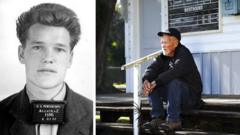Charlie Hopkins, at the age of 93, stands as a living link to one of America's most infamous prisons, Alcatraz, and shared insights into his past during a recent interview. Sentenced in 1955 for kidnapping and robbery, Hopkins recalls the eerie quiet of life on the rocky island where the waves lapped against its shores, often reminiscing about the haunting sounds he heard while confined there.
Having moved back to Florida post-release in 1963, he believes he is likely the last former inmate of Alcatraz, though this has not been independently verified. Reflecting on his incarceration, he recounts the somber reality of a prison life filled with few distractions and a severe lack of activities, leaving him to engage in menial tasks like floor cleaning or solitary exercise to pass the time.
At Alcatraz, Hopkins mingled with notorious criminals, including mobster Al Capone and the "Birdman," Robert Stroud. These associations turned the prison into a cultural icon, inspiring countless films and documentaries. Despite the high-security measures enforced there, Hopkins managed to find himself in "D Block," the solitary confinement area, for several days after assisting fellow inmates in an escape attempt, a venture ultimately thwarted by vigilant prison guards.
As Alcatraz transitioned from a federal prison to a popular museum, recent statements made by former President Donald Trump raised eyebrows as he suggested reopening the institution for "the country's most ruthless and violent offenders." To many experts, including Hopkins, this idea appears impractical and costly. The aging and decaying infrastructure of the island would require exorbitant funds to repair outdated systems, especially regarding sanitation—issues that stand out even to an inmate who remembers them firsthand.
After serving time, Hopkins received psychiatric help, which positively impacted his life, leading him to work in various jobs in Florida. In addition to reflecting on his past to help others, he penned a memoir detailing his turbulent life, where he confronts his former behavior with candor. In regard to Trump’s proposition, he considers it less about actual plans and more a tool to communicate a message about crime and immigration policies. "He don't really want to open that place," Hopkins claims, suggesting the notion serves as rhetoric rather than a practical undertaking.





















